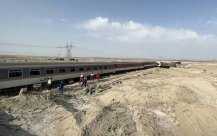(Berne Comprehensive) The global air quality report released by Swiss Air Clean Technology Company IQAIR shows that hundreds of millions of people around the world breathe dirty air that is far beyond the health level, and climate change is intensifying air pollution.
IQAIR uses tens of thousands of monitoring stations all over the world for real time and space quality analysis. Its sensors can measure car tail gas, power plant exhaust gas, desert sandstorms, and the suspended particles in the haze generated by stoves and wildfires..5 concentration.
In September last year, the World Health Organization issued a guidance principle to reduce the acceptable content of PM2.5 to 5 micrograms per cubic meter, but in the report released by IQAIR on Tuesday, none of the countries met the standards.
Bangladesh was listed in the world's most serious country in 2021
IQAIR last year from 6,475 cities in 117 countries, air monitoring by the government and private operationsThe station collected data, and the results showed that only 222 cities reached the WHO standard, but the PM2.5 content in the air in 93 countries was 10 times that of the WHO.
The report lists Bangladesh as the country with the worst air pollution in 2021 in 2021. Its PM2.5 concentration is 76.9 micrograms per cubic meter.The report said: "The air quality of Central Asia and South Asia is the worst in the world, and 46 of the 50 cities with the worst air pollution worldwide are in this area."Nia's air is the cleanest, the PM2.5 concentration is 3.8 micrograms per cubic meter; the PM2.5 concentration in Finland is the lowest in developed countries (5.5).
IQAIR CEO of North America, Hemes, pointed out that the report revealed huge differences in various places in terms of air quality data, such as Africa, Central America and Latin America.
She said: "The country with the second severe air pollution in 2021 is Chad. The previous year, we could not even get relevant data from there. This shows that we have to do more to make up for the monitoring station.Insufficient. But in areas with serious air pollution, there is still a certain gap in collecting air quality and data. "




